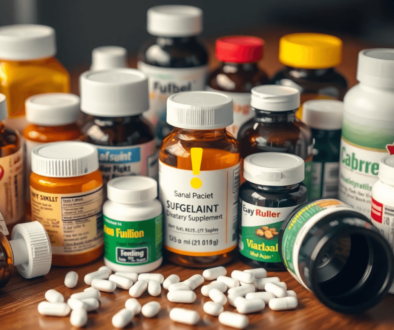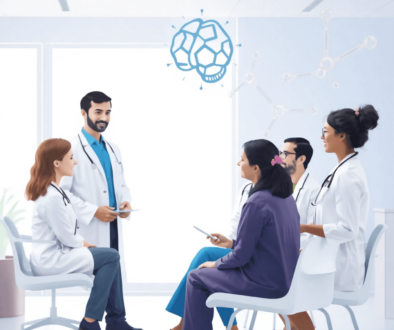What Patients Need to Know About Biologics and Biosimilars
Biologics and biosimilars are advanced medications made from living cells, proteins, or sugars. They are transforming the way we treat different diseases.
This article is designed to educate patients about the importance of biologics and biosimilars in today’s medicine.
By understanding these medications, patients can take control of their healthcare decisions and choose the best treatment options for themselves.
Understanding Biologics
Biologic medications, derived from living cells, proteins, and sugars, are a crucial part of modern medicine. Here’s what you need to know about these innovative treatments:
What are Biologics?
Biologics are complex medications made from living organisms or their components. They are distinct from traditional chemical drugs because of their intricate structure and manufacturing process.
Common Diseases Treated
Biologics are commonly used to manage autoimmune diseases and inflammatory conditions such as:
- Rheumatoid arthritis
- Juvenile arthritis
- Ankylosing spondylitis
- Psoriatic arthritis
These conditions often require targeted therapies that biologics can provide.
Importance in Modern Medicine
Biologics have revolutionized the treatment of various diseases by targeting specific pathways in the immune system. They offer personalized approaches that can effectively manage symptoms and improve patients’ quality of life.
By understanding how biologics work and their significance in treating autoimmune and inflammatory conditions, patients can make informed decisions about their healthcare journey.
What Are Biosimilars?
Biosimilars are like the understudies to the original biologics—highly similar but not exact replicas. The biosimilars definition hinges on this similarity: they must match the reference biologic in terms of safety, efficacy, strength, dosage form, and intended use. However, because biologics are made from living organisms, replicating them down to the last molecule is impossible. Think of it as trying to photocopy a masterpiece painting—you get a near-perfect version, but tiny brushstroke differences remain.
The FDA has a starring role here, rigorously reviewing biosimilars before giving them the green light. This review ensures that biosimilars perform just as well as their reference products without introducing new risks. The approval process involves extensive analytical studies, animal testing, and clinical trials to confirm no meaningful clinical differences exist.
Key points about biosimilars:
- Derived from the reference biologic but produced separately.
- Not identical copies due to manufacturing complexities.
- FDA-approved after thorough evaluation for safety and effectiveness.
Biosimilars expand treatment options by offering equally effective alternatives that meet strict regulatory standards—so patients don’t have to compromise quality for affordability.
Differences Between Biosimilars and Generic Drugs
Generics vs. Biosimilars: Understanding the Basics
Generics are typically small molecules chemically identical to the brand-name drug, whereas biologics and biosimilars are large complex molecules produced from living cells or organisms. This fundamental difference in structure impacts how they are manufactured, regulated, and used in clinical practice.
The Regulatory Challenge: Why Biosimilars Are Different
The intricate nature of biologics makes it challenging to create exact copies like traditional generics. Biosimilars undergo rigorous testing to demonstrate similarity but not identicalness to the reference product due to their complex structure. Therefore, biosimilars have a distinct approval process tailored to ensure safety and efficacy comparable to the original biologic.
Patient Perspective: What You Need to Know
Patients transitioning from generics to biosimilars may encounter differences in administration, storage, or monitoring requirements due to the unique characteristics of biologics. It’s essential for patients to collaborate closely with healthcare providers to grasp these distinctions fully and set realistic treatment expectations based on the specific nuances of biosimilar therapies.
Benefits of Biosimilars for Patients
Lower-Cost Alternative Compared to Original Biologics
Biosimilars offer a more affordable option for patients compared to the original biologics. By leveraging existing research on the reference product’s safety and effectiveness, biosimilars can be produced at a lower cost, making them a cost-effective choice for patients who require these treatments.
Increased Patient Access to Important Therapies
Biosimilars play a crucial role in improving patient access to essential therapies. With lower costs and increased availability, biosimilars ensure that more patients can benefit from these life-changing treatments without facing financial barriers.
Influence of Insurance Coverage on Switching between Biologics and Biosimilars
Insurance coverage often plays a significant role in determining whether patients switch from original biologics to biosimilars. Patients may opt for biosimilars due to better coverage or cost-saving benefits provided by their insurance plans, highlighting the importance of understanding insurance policies when considering treatment options.
Use Cases and Conditions Treated with Biosimilars
Biosimilars have shown effectiveness in treating chronic skin conditions such as psoriasis. Patients can benefit from these lower-cost alternatives without compromising on quality care.
Biosimilars play a crucial role in managing bowel diseases and specific types of cancers, including breast cancer. These medications provide patients with more accessible treatment options while maintaining efficacy.
The approval of interchangeable biosimilars offers flexibility in treatment options. Patients may find it easier to transition between biologics and biosimilars based on their healthcare needs and insurance coverage.
By exploring the use cases of biosimilars in treating various conditions like psoriasis, bowel diseases, and certain cancers, patients can better understand the expanding role of these medications in modern healthcare.
Switching from Biologics to Biosimilars: What Patients Should Know
Switching from an original biologic to a biosimilar isn’t just about swapping out one medication for another like changing your morning coffee brand. This kind of medication switching happens for a few key reasons:
- Insurance changes: Sometimes insurance plans decide to cover biosimilars instead of the original biologics because they cost less.
- Cost-saving: Even if insurance stays the same, biosimilars often come with lower out-of-pocket expenses.
Before making any switch, having a clear conversation with your healthcare provider is non-negotiable. They’ll help you understand:
- Potential risks and benefits
- How this change might affect your symptoms or side effects
- What kind of monitoring you’ll need during the transition
Keep in mind, biologics and biosimilars are complex medications. Your body might respond slightly differently when you switch, even though biosimilars are designed to be just as effective and safe.
Monitoring treatment effectiveness becomes the star of the show here—your healthcare team will likely schedule follow-ups or lab tests to make sure everything’s on track. If you notice any unexpected changes, report them promptly.
Navigating medication switching can feel like jumping into the deep end, but armed with information and good communication, it’s more like stepping into a warm pool—manageable and safe.
Regulatory Landscape for Biosimilars: Ensuring Safety and Efficacy
Overview of FDA’s rigorous review standards for biosimilar approval focusing on safety and efficacy
The FDA employs a strict evaluation process to ensure the safety and efficacy of biosimilars. Before approval, biosimilar manufacturers must demonstrate that their product is highly similar to the original biologic in terms of structure, function, and clinical outcomes. This comprehensive review helps guarantee that patients can trust the quality and effectiveness of biosimilars.
Explanation of interchangeable biosimilar status allowing pharmacist substitution without doctor consultation depending on state laws
Certain biosimilars may receive an interchangeable designation from the FDA, indicating that they can be substituted by pharmacists without requiring consultation with the prescribing healthcare provider. This status streamlines access to these medications, making it more convenient for patients to receive their prescribed treatment promptly.
Limitations regarding insurance coverage regulation by FDA
While the FDA regulates the approval and safety of biosimilars, it does not have authority over insurance coverage policies. Patients may encounter variations in coverage based on their insurance plans and providers. It’s essential for individuals to consult with their healthcare team and insurers to understand how biosimilar options align with their coverage and treatment needs effectively.
Special Consideration: Insulin as a Biologic
In a significant shift, the FDA has recently transitioned the regulation of insulin products from chemical drug regulation to biologic classification. This change in classification opens up new opportunities for the development and approval of biosimilar insulins.
What are Biosimilar Insulins?
Biosimilar insulins are biologic medications that are highly similar to an already approved reference insulin product. They have no clinically meaningful differences in terms of safety, efficacy, and quality. Biosimilars offer an alternative treatment option for individuals with diabetes who require insulin therapy.
Benefits of Biosimilar Insulins
One of the key advantages of biosimilar insulins is their potential to provide lower-cost alternatives to brand-name insulins. Depending on insurance plans and coverage policies, patients may have access to these biosimilars at a reduced out-of-pocket expense compared to traditional insulin therapies.
This shift towards biologic classification and the introduction of biosimilar insulins can lead to increased competition in the market, ultimately benefiting patients by making insulin more affordable and accessible.
What Patients Should Keep in Mind About Biologics and Biosimilars
When it comes to patient awareness about biologics and biosimilars, clarity is king. Both types of medications are approved by the FDA/Health Canada, which means they have passed rigorous safety and efficacy tests. No cut corners here—these are trusted options for managing complex conditions.
Patients should feel empowered to:
- Ask questions about their treatment plans. Whether it’s your first biologic or you’re considering a switch to a biosimilar, open dialogue with your healthcare provider is essential.
- Discuss personalized care tailored to your unique health situation. Biologics and biosimilars aren’t one-size-fits-all; your doctor can help determine what fits best for you.
- Stay informed about cost options. Biosimilars often come with lower price tags, making therapies more accessible without compromising on quality.
Keep in mind that both biologics and biosimilars are designed to deliver the same therapeutic benefits. The goal is your health, not confusion. So, when you hear “biosimilar,” think “safe, effective, and often budget-friendly.” Your healthcare team is your best resource—lean on them to navigate these choices confidently.
Patient awareness isn’t just about knowing what these drugs are—it’s about understanding how they fit into your treatment journey and making sure that journey stays smooth and effective.
Conclusion
Highlight: misterpharmacist.com stands tall as the only 5-star rated online pharmacy in Toronto, providing trustworthy delivery services throughout the GTA.
Encouragement: Patients are urged to have open discussions with their healthcare providers about medication options, emphasizing the accessibility of affordable treatments through reputable pharmacies.
Remember, your health journey is a partnership. Stay informed, stay engaged, and make empowered choices for your well-being.



